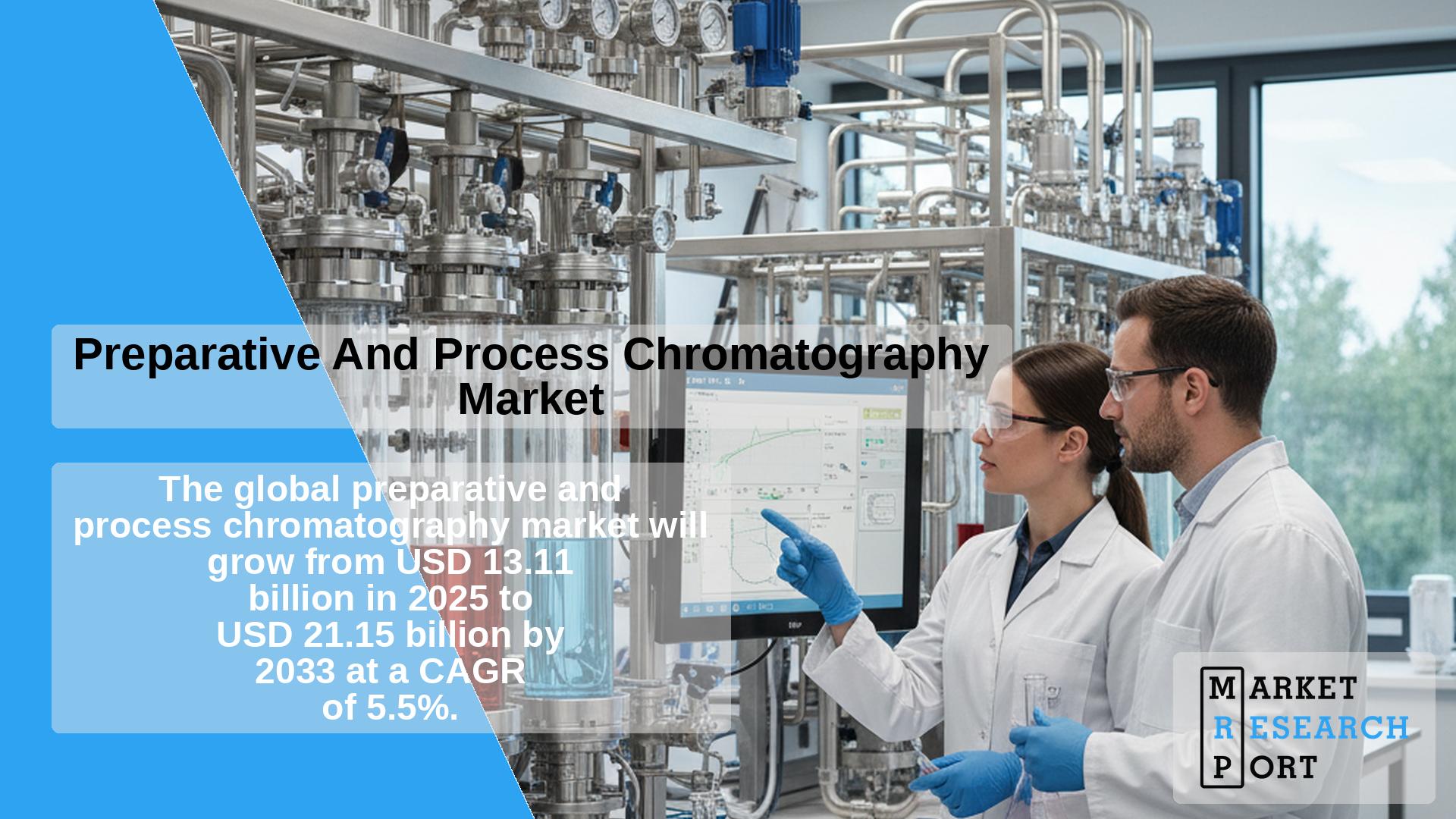
The global preparative and process chromatography market was valued at approximately USD 13.78 billion in 2025 and is forecast to grow to USD 21.15 billion by 2033, corresponding to a compound annual growth rate (CAGR) of 5.50%. This growth is primarily driven by the escalating demand and regulatory approvals for monoclonal antibodies in the pharmaceutical and biotechnology industries.
Growth in the preparative and process chromatography market is fueled by the thriving biopharmaceutical sector, the increased need for effective purification techniques, and efforts to improve cost-efficiency in production processes. For example, in September 2025, Samsung Biologics extended its capacity and flexibility for biopharma partnerships by offering end-to-end CDMO services, supporting development through commercial production with robust quality systems and supply chain resilience.
Technological progress continues to play a pivotal role. For instance, the launch of advanced high-performance liquid chromatography (HPLC) systems featuring elevated temperature capabilities has enhanced resolution and separation, improving purification outcomes.
The COVID-19 pandemic positively impacted the market by increasing demand for vaccines and therapeutic drugs, further emphasizing the importance of chromatography in downstream processing and treatment development.
Expanding applications of chromatography now address insulin purification, omega-3 fatty acid isolation, food safety testing, and support for an aging population’s health diagnostics. Additionally, continuous innovations in monoclonal antibody analysis, mild reverse-phase chromatography, and affinity chromatography improve protein purification essential to costly downstream bioprocessing stages.
Ongoing rapid innovation addresses the increasing complexity of bioprocessing through the development of specialized resins with higher binding capacities, enhanced selectivity, and greater chemical stability for precise and efficient purification.
Integration of automation and digital monitoring enables real-time control, reduces manual errors, and improves reproducibility. Continuous and multi-column chromatography technologies are transforming traditional batch processes by increasing throughput, scaling production, and reducing solvent usage.
Mergers and acquisitions strategically help companies broaden technological capabilities, expand product portfolios, and strengthen their global presence.
Compliance with regulatory standards like Good Manufacturing Practices (GMP) in pharmaceutical and biopharmaceutical industries drives demand for validated chromatography solutions.
Product expansions include a wide array of media types, column formats, and automation tailored for biologics, gene therapies, and complex molecules.
Geographically, Asia Pacific leads growth due to increased biopharma activities, while regions such as Latin America, the Middle East, and Africa develop gradually with enhanced infrastructure and local manufacturing.
Process chromatography dominates with a substantial revenue share, widely used in large-scale biopharmaceutical manufacturing and process scale-up. This demand aligns with the growth seen in pharmaceutical industries worldwide.
Preparative chromatography is expected to record the fastest compound annual growth rate, owing to its precision and effectiveness in isolating high-value compounds for clinical and preclinical trials.
Liquid chromatography leads as a type due to its application in isolating bioactive compounds and ensuring product quality during production across pharmaceutical and specialty chemical sectors.
Hydrophobic interaction chromatography is poised for the fastest growth, benefiting from its use in analyzing protein folding and working with monoclonal antibodies, an expanding oncology treatment field.
The pharmaceutical segment holds the largest market share, driven by its extensive use in drug safety assessment, quality control, and large-scale manufacturing. Innovations in single-use chromatography systems enhance cost-effectiveness and scalability while maintaining compliance with regulatory standards.
Biotechnology, the fastest-growing end-use sector, intensifies investment in protein isolation, personalized medicine, and automated preparative chromatography technologies.
Leading the market with a significant share, North America’s growth is propelled by robust R&D investments and a mature pharmaceutical landscape. For example, GSK announced a sizeable funding commitment for R&D and manufacturing facilities, including chromatography-centered laboratories in the U.S.
Europe exhibits dynamic growth backed by next-generation biologics R&D, use of continuous chromatographic technologies, and regulatory pressures for high-purity biologics. Strong market activity is seen in countries like the UK, Germany, and France.
The region registers the highest growth rate, driven by fast-expanding pharmaceutical sectors in China, India, Japan, and South Korea. Significant investments in GMP facilities and advanced chromatographic technologies propel this growth.
These regions are developing markets supported by expanding biotech industries, government healthcare investments, and growing demand for high-quality pharmaceutical products. Challenges remain around infrastructure and skilled workforce availability.
This report covers revenue forecasts, competitive landscape, growth drivers, and market trends from 2021 to 2033 across product types, chromatography types, end-use industries, and geographic regions. It provides detailed insights for stakeholders across the pharmaceutical, biotechnology, food, and nutraceutical sectors.
What factors are driving market growth?
Increasing governmental R&D investments, expanding use of chromatography in food and nutraceuticals, and rising demand for biopharmaceutical products.
How large is the preparative and process chromatography market?
Estimated at USD 13.78 billion in 2025 with substantial growth projected.
What is the expected CAGR?
The market is anticipated to grow at 5.50% CAGR from 2025 to 2033.
Which region holds the largest market share?
North America, driven mainly by the United States’ established pharmaceutical and biotechnology sectors.